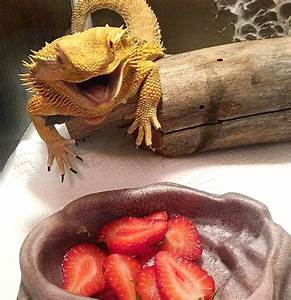How to Properly Feed Your Bearded Dragon: Nutrition and Feeding Schedule

Providing a nutritious, balanced diet is crucial to keeping your bearded dragon healthy and thriving. As omnivores, bearded dragons require a variety of insects, vegetables, and occasional fruits to meet their nutritional needs. In this guide, we’ll explore age-appropriate diets, a feeding schedule, and tips to ensure your dragon gets all the nutrients they need.
1. Understanding Bearded Dragon Diets by Age
Bearded dragons have different nutritional needs at each stage of life:
- Baby Dragons (0-6 months): Baby dragons grow quickly and need a diet high in protein to support development. This means about 80% of their diet should be live insects, with the remaining 20% coming from leafy greens and vegetables.
- Juvenile Dragons (6-12 months): Juveniles still require significant protein but can start increasing their intake of vegetables. Aim for a diet of 60% insects and 40% greens.
- Adult Dragons (12+ months): Adult bearded dragons need more vegetables and a lower amount of protein, with 80% of their diet from greens and 20% from insects.
These age-based guidelines are essential for supporting growth in younger dragons and preventing obesity in adults.
2. Selecting Insects and Protein Sources
Protein is a vital part of a bearded dragon’s diet, especially during early life stages. However, not all insects are created equal:
- Dubia Roaches: High in protein, easy to digest, and lower in fat, dubia roaches are an excellent staple insect.
- Crickets: Widely available and affordable, but they should be gut-loaded (fed nutritious foods) before feeding to your dragon.
- Mealworms and Superworms: These can be given occasionally to adult dragons, but they’re high in fat, so avoid giving them to younger dragons frequently.
Tip: Always dust insects with calcium powder (with or without vitamin D3, depending on your lighting setup) before feeding to help prevent metabolic bone disease.
Recommended Products
- Zoo Med Repti Calcium (with or without D3)
- NutriGrubs (black soldier fly larvae, great calcium source)
3. Best Vegetables and Greens for Bearded Dragons
Vegetables and leafy greens are crucial to your dragon’s health, providing fiber, vitamins, and hydration:
- Leafy Greens: Collard greens, mustard greens, dandelion greens, and turnip greens are all nutritious staples.
- Vegetables: Bell peppers, squash, zucchini, and carrots can be offered as part of a balanced diet.
Avoid These Foods
Not all vegetables are suitable for bearded dragons. Avoid spinach, kale, and iceberg lettuce as they can interfere with calcium absorption or have low nutritional value.
Recommended Greens & Vegetables Products
4. Fruits: An Occasional Treat
Fruits are high in sugar and should only be offered occasionally:
- Safe Fruits: Blueberries, strawberries, apples, and mango are all suitable in small quantities.
- Serving Size: Offer fruit no more than once a week as a small part of their meal.
Tip: Chop fruits into bite-sized pieces to prevent choking and mix them into their greens to encourage interest.
5. Creating a Feeding Schedule
Following a consistent feeding schedule keeps your bearded dragon on a routine and ensures they get proper nutrition. Here’s a suggested schedule based on age:
- Baby Dragons (0-6 months): Feed live insects 2-3 times daily, and offer greens once daily.
- Juvenile Dragons (6-12 months): Feed live insects once daily and greens once daily.
- Adult Dragons (12+ months): Offer greens daily and protein (insects) only 2-3 times per week.
Feeding Frequency Tips
If your dragon doesn’t finish their food, remove it after about 15-20 minutes to keep the enclosure clean and prevent overeating.
6. Hydration Tips
Bearded dragons get much of their hydration from their food, but they still need additional water:
- Water Bowl: Place a shallow dish of fresh water in their enclosure, refreshed daily.
- Misting: Lightly mist greens with water before serving to add extra hydration.
- Bathing: Offer a shallow, lukewarm bath once or twice a week for hydration and shedding.
7. Monitoring Your Dragon’s Health and Appetite
A healthy dragon has a good appetite and shows interest in food. Changes in behavior or appetite can indicate health issues:
- Signs of Health: Bright eyes, active behavior, and regular eating.
- Signs of Illness: Loss of appetite, lethargy, swollen joints, or weight loss.
If you notice any concerning signs, consult a reptile veterinarian to ensure your dragon’s health.
Final Thoughts
A well-balanced diet and regular feeding schedule help your bearded dragon thrive. With the right nutrition and feeding routine, your pet will stay healthy and happy, rewarding you with their unique personality and charm.
Remember, each dragon is unique—paying attention to your pet’s needs and preferences is the best way to create a diet plan that works for them. Enjoy feeding time with your dragon, and let us know if you have any questions in the comments!
